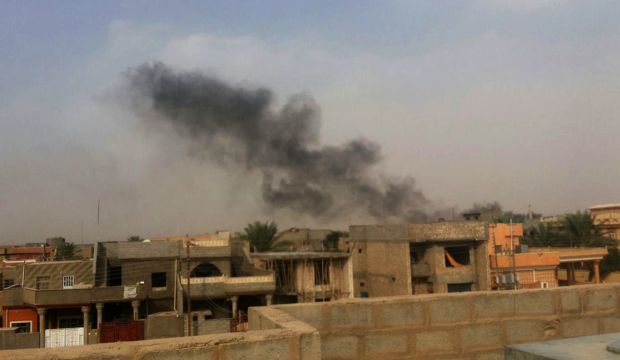
Smoke plumes are visible over buildings in the Iraqi town of Hit, in western Anbar province, 85 miles (140 kilometers) west of Baghdad. (AP Photo)
Baghdad, Asharq Al-Awsat—Despite suffering setbacks elsewhere in Iraq, the Islamic State of Iraq and Syria (ISIS) continues to advance in the country’s western Anbar province.
ISIS seized an Iraqi military camp in Hit on Monday, around 90 miles (150 kilometers) from Baghdad, after Iraqi forces carried out what it termed a “tactical retreat” from the area. Iraqi military officials claimed to have removed equipment and arms from the base, in addition to burning food supplies in order to deny ISIS fighters’ provisions. This is the third Iraqi military base seized by ISIS fighters in Anbar over the past month.
Speaking at a press conference on Monday, Ahmed Hamid, the head of the Anbar Provincial Council’s security committee, said around 300 members of the security forces had withdrawn from Hit.
Sheikh Arkan Al-Kaoud, a Hit tribal elder, told Asharq Al-Awsat that “the fall of the military camp occurred following clashes between the security forces and ISIS.”
The UN estimated that as many as 180,000 people have fled fighting in and around the city of Hit in western Anbar province, with many heading east towards Salah Al-Din province.
Speaking to Asharq Al-Awsat, Jabour tribal chief Sheikh Khamis Al-Jabara stressed that ISIS would not be able to gain a foothold in territory under its control in Salah Al-Din. The Jabour tribe is one of the most prominent tribes in the central Iraqi province.
“ISIS attempts to enter [the city of] Dhuluiya, Qada and other areas under Jabour control have met with failure due to the steadfastness of the people of the region,” Sheikh Al-Jabara said.
He confirmed that ISIS has used heavy weaponry, including mortars, as well as car bomb attacks, in its attempts to gain a foothold in the central province.
“There are areas [in Salah Al-Din] that are under the control of other tribes which have fallen to ISIS . . . but the only way they will enter Qada is over our dead bodies,” Jabara said.
The Jabour tribal chief attributed ISIS’s failure in the region due to the strength and unity of the tribe which is fighting against the terrorist group and its fighters. He added that other parties, including government forces, are standing with the tribe to confront ISIS’s advance.
